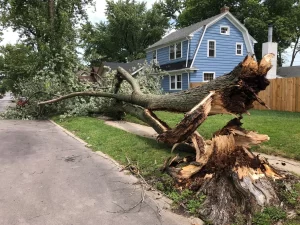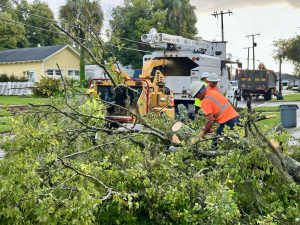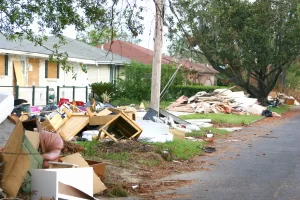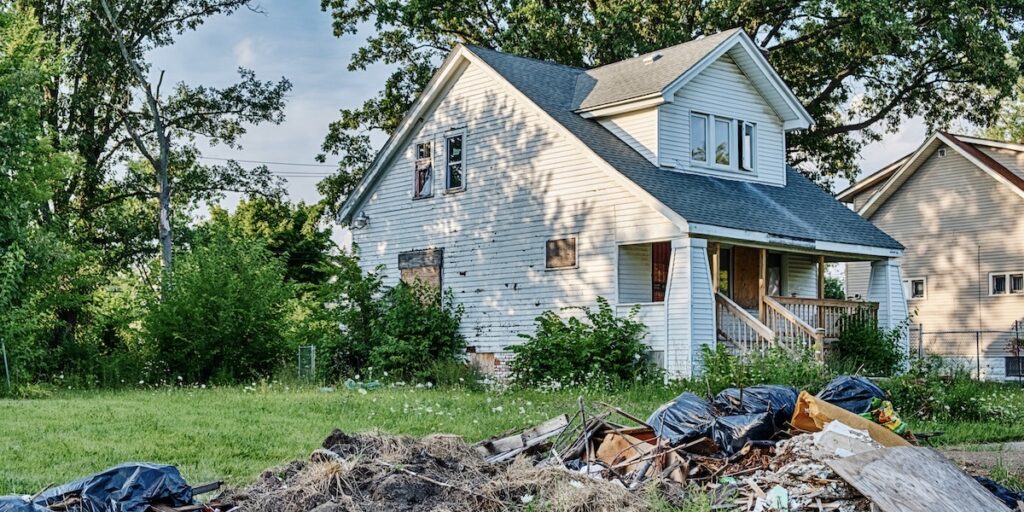Creating a Hurricane Damage Cleanup Plan: What You Need to Know
Hurricanes are among nature’s most destructive forces, leaving behind trails of devastation that can take weeks or even months to clean up. From downed power lines and flooding to fallen trees and structural damage, the aftermath of a hurricane can be overwhelming. While it’s impossible to prevent a hurricane from striking, having a well-thought-out cleanup plan can make a significant difference in how quickly and safely you can recover. Whether you’re a homeowner, a property manager, or part of a community organization, understanding the key elements of a hurricane damage cleanup plan is essential.
Assessing the Aftermath
 The first step in any cleanup plan begins after the storm has passed and it is deemed safe to go outside. It’s crucial to assess the damage with a clear and methodical approach. Start by checking for any immediate hazards such as gas leaks, electrical issues, or unstable structures. If there are downed power lines or the smell of gas, it is best to contact emergency services before proceeding. Prioritize personal safety by wearing protective gear such as gloves, boots, and masks, especially when dealing with contaminated floodwaters or debris.
The first step in any cleanup plan begins after the storm has passed and it is deemed safe to go outside. It’s crucial to assess the damage with a clear and methodical approach. Start by checking for any immediate hazards such as gas leaks, electrical issues, or unstable structures. If there are downed power lines or the smell of gas, it is best to contact emergency services before proceeding. Prioritize personal safety by wearing protective gear such as gloves, boots, and masks, especially when dealing with contaminated floodwaters or debris.
Take photographs or videos of the damage before starting any cleanup activities. These visual records will be invaluable for insurance claims, disaster relief assistance, and long-term repair planning. Having a complete inventory of damage also helps in communicating with contractors and emergency services. Check This Out for additional tips on how to safely and effectively navigate post-storm cleanup.
Coordinating Cleanup Efforts
Once the initial assessment is done, it’s time to start organizing the cleanup process. If you’re in a residential area, reach out to neighbors and local volunteers to coordinate efforts. Many hands can make light work, especially when clearing large debris like fallen trees or furniture ruined by floodwater. In rural or less-populated areas, contacting local government or community organizations for assistance may be necessary.
It’s also important to understand which tasks can be managed personally and which require professional help. For example, cleaning out a flooded basement or handling mild roof damage may be possible for a homeowner with basic tools. However, mold remediation, electrical repairs, or demolition should always be handled by certified professionals to prevent injury and ensure the work is done safely.
Handling Waste and Debris
Hurricane damage often produces large amounts of waste, including building materials, spoiled food, personal belongings, and yard debris. It’s essential to separate waste into categories such as organic waste, hazardous materials, and general debris. Not only does this make disposal easier, but many municipalities have specific guidelines and schedules for different types of waste collection after a storm.
Check with local waste management services to understand how and when items will be picked up. In some cases, special permits may be required for large-scale disposal or the use of rented dumpsters. Avoid burning debris unless local authorities specifically permit it, as it may pose additional fire risks or violate air quality regulations.
Preventing Further Damage
During the cleanup process, take steps to prevent further damage to your property. Tarping over damaged roofs, boarding up broken windows, and removing standing water are all essential tasks that can minimize additional destruction from the elements or pests. The quicker you can secure your property, the easier the eventual recovery will be.
Keep in mind that mold can begin to grow within 24 to 48 hours in damp environments. Use fans, dehumidifiers, and proper ventilation to dry out affected areas quickly. If mold growth is already visible or extensive, it is highly recommended to bring in professional services, as improper handling can spread spores and worsen health risks.
Documenting for Recovery and Insurance
 One of the most vital yet often overlooked parts of hurricane damage cleanup is thorough documentation. Beyond the initial photos and videos, keep a detailed record of all cleanup activities, including receipts for supplies, hired services, and any temporary accommodations. This documentation will support your insurance claims and can also help you apply for disaster relief from government or nonprofit agencies.
One of the most vital yet often overlooked parts of hurricane damage cleanup is thorough documentation. Beyond the initial photos and videos, keep a detailed record of all cleanup activities, including receipts for supplies, hired services, and any temporary accommodations. This documentation will support your insurance claims and can also help you apply for disaster relief from government or nonprofit agencies.
Stay in regular communication with your insurance provider throughout the process. Understand what is covered under your policy and follow their guidelines carefully when making repairs or hiring services. In some cases, making unauthorized repairs could impact your reimbursement eligibility.
Emotional and Community Support
Cleanup is not just a physical process; it’s an emotional journey as well. Seeing your home or neighborhood damaged can be distressing, and the stress of recovery can take a toll on your mental health. It’s important to take breaks, stay connected with loved ones, and seek emotional support when needed.
Community support can also be a powerful tool. Local organizations, religious groups, and government agencies often provide resources like food, shelter, and volunteers. Don’t hesitate to reach out, and be open to offering help if you are able. Collective resilience is one of the strongest assets in disaster recovery.
The Importance of Regular Yard Debris Cleanup
Maintaining a clean and well-kept yard is not just about aesthetics—it’s a crucial part of property maintenance and environmental care. Yard debris, which includes fallen leaves, branches, grass clippings, and other organic matter, can accumulate quickly and create more than just an eyesore. While it might be tempting to let nature take its course, the benefits of regular yard debris cleanup go far beyond a neat appearance.
Enhancing Curb Appeal and Property Value
First impressions matter, especially when it comes to real estate. A well-maintained yard reflects the care and attention given to the entire property. Overgrown grass, scattered branches, and piles of leaves can make even the most beautiful home appear neglected. Regular cleanup ensures that the landscape remains tidy and inviting, contributing significantly to curb appeal.
For homeowners considering selling their property, this aspect becomes even more important. A clean, landscaped yard adds value and appeal to prospective buyers, making it easier to stand out in a competitive market. Even if selling isn’t on the horizon, a beautiful yard creates a welcoming space for friends, family, and personal enjoyment.
Preventing Pest Infestations
 Yard debris can be an open invitation for a variety of pests. Rodents, insects, and even snakes often seek shelter in piles of leaves or unkempt vegetation. These creatures can pose a risk not only to the yard itself but also to the home, as many pests find their way indoors when outdoor conditions become less favorable.
Yard debris can be an open invitation for a variety of pests. Rodents, insects, and even snakes often seek shelter in piles of leaves or unkempt vegetation. These creatures can pose a risk not only to the yard itself but also to the home, as many pests find their way indoors when outdoor conditions become less favorable.
Regular cleanup reduces hiding places and breeding grounds for these pests. Removing organic clutter disrupts their habitat and discourages them from settling in the yard. In the long run, this minimizes the need for chemical pest control methods and contributes to a healthier, more balanced outdoor environment.
Reducing Fire Hazards
In many regions, especially those prone to dry weather and high temperatures, accumulated yard debris can become a serious fire hazard. Dry leaves, twigs, and grass can ignite quickly, turning a small spark into a dangerous blaze. This risk is particularly high during summer months or in areas experiencing drought.
By clearing away dry and flammable materials on a regular basis, homeowners can significantly lower the risk of fire. In some jurisdictions, maintaining a defensible space around the home is not only a safety measure but also a legal requirement. Regular yard maintenance plays a critical role in fulfilling these safety standards.
Promoting Plant Health and Garden Growth
An overabundance of organic matter on the ground can negatively affect the health of plants and lawn. Thick layers of leaves can smother grass and hinder its growth by blocking sunlight and trapping excessive moisture. Similarly, fallen branches and debris can encourage the growth of mold and fungi that may spread to healthy plants.
Cleaning the yard regularly helps maintain a balanced ecosystem in the garden. It allows plants to receive the light, water, and nutrients they need without competition or obstruction. A healthy, thriving garden is not only more beautiful but also more resilient to disease and changing weather conditions.

Preventing Drainage and Flooding Issues
Clogged drainage systems are another common problem associated with unattended yard debris. Leaves and twigs can easily block gutters, storm drains, and irrigation systems, leading to water backup and potential flooding during heavy rains. In addition to damaging landscaping, poor drainage can affect the foundation of a home and result in costly repairs.
Routine yard cleanup helps keep water flowing where it should. By clearing debris before it becomes a blockage, homeowners can prevent pooling and erosion and preserve the integrity of their property’s infrastructure. Proactive maintenance is always more cost-effective than emergency fixes.
Encouraging Outdoor Activity and Enjoyment
A clean and inviting yard encourages more time spent outdoors, whether it’s gardening, playing with children, hosting gatherings, or simply relaxing. The mental and physical health benefits of spending time in nature are well-documented. However, a cluttered or messy yard can discourage outdoor enjoyment and even present safety hazards.
By keeping the yard clear of debris, homeowners create a safer and more pleasant space for themselves and their families. Regular upkeep becomes part of a lifestyle that values both wellness and environmental stewardship.
The Financial Benefits of a Thorough Storage Unit Cleanout
In a world where clutter quietly accumulates and forgotten items gather dust, storage units have become a convenient but often costly solution. While they serve a purpose—offering space when we’re in transition or simply out of room—they can also become financial traps. Many individuals continue paying monthly rental fees for years without realizing the hidden value that lies within these rented spaces. A thorough storage unit cleanout is not only a step toward organization and clarity, but also a strategic financial decision with a host of benefits. From saving money to uncovering hidden assets, taking the time to sort through a storage unit can result in significant financial gains.
Reducing Ongoing Rental Costs
 One of the most immediate financial benefits of a cleanout is eliminating or reducing the monthly rental cost of the storage unit. Storage facilities can charge anywhere from $50 to several hundred dollars per month depending on the size and location. Over time, this recurring expense can add up to thousands of dollars. Often, people keep paying these fees out of convenience or the belief that their items have long-term value. However, many find that once they actually go through the contents, the majority of items are outdated, damaged, or no longer needed. A cleanout offers a chance to reassess the worth of the stored belongings and determine whether continuing to pay for the space is financially justifiable.
One of the most immediate financial benefits of a cleanout is eliminating or reducing the monthly rental cost of the storage unit. Storage facilities can charge anywhere from $50 to several hundred dollars per month depending on the size and location. Over time, this recurring expense can add up to thousands of dollars. Often, people keep paying these fees out of convenience or the belief that their items have long-term value. However, many find that once they actually go through the contents, the majority of items are outdated, damaged, or no longer needed. A cleanout offers a chance to reassess the worth of the stored belongings and determine whether continuing to pay for the space is financially justifiable.
Discovering Hidden Valuables
Storage units often become time capsules, preserving pieces of our past that we’ve forgotten. During a thorough cleanout, people are sometimes surprised to find items of real value tucked away among the clutter. Whether it’s antiques, collectibles, vintage electronics, or even documents like savings bonds or unclaimed checks, a careful inspection can uncover unexpected treasures. Some individuals have even discovered items that have appreciated in value over time. Selling these assets—whether through garage sales, online marketplaces, or auction sites—can turn forgotten goods into a source of income.
Opportunities for Resale and Donation Tax Deductions
Another overlooked financial upside of a cleanout is the opportunity to resell gently used items. Clothing, furniture, electronics, and kitchenware can all find new homes, and the money earned from their sale can offset past storage fees or contribute to other financial goals. Even if items are not worth reselling, donating them to charitable organizations can offer tax benefits. Many donations qualify for tax deductions, provided they are given to registered charities and properly documented. While not immediate cash, these deductions can reduce one’s taxable income and result in savings during tax season.
Freeing Up Mental and Physical Space
While not always measured in dollars and cents, the psychological and logistical benefits of a cleanout can lead to smarter financial decisions in the long term. A cluttered storage unit often reflects a cluttered mindset. By organizing and simplifying possessions, individuals gain greater clarity about what they own and what they truly need. This can lead to more mindful consumption habits, preventing future unnecessary purchases. Additionally, if the items from a cleanout can be integrated into one’s home or used to replace things that would otherwise be bought new, it creates a direct financial benefit by reducing spending.
Improving Insurance and Inventory Records
 Another often-overlooked financial benefit of a storage unit cleanout is improved documentation for insurance purposes. Knowing exactly what you own, where it is stored, and its value can be crucial in the event of a loss or claim. Many people pay for renters or storage unit insurance but lack updated inventory records, which can complicate or limit reimbursement. A cleanout gives an opportunity to catalog valuable items and update insurance records accordingly. This proactive approach ensures adequate coverage and can avoid financial loss in the future.
Another often-overlooked financial benefit of a storage unit cleanout is improved documentation for insurance purposes. Knowing exactly what you own, where it is stored, and its value can be crucial in the event of a loss or claim. Many people pay for renters or storage unit insurance but lack updated inventory records, which can complicate or limit reimbursement. A cleanout gives an opportunity to catalog valuable items and update insurance records accordingly. This proactive approach ensures adequate coverage and can avoid financial loss in the future.
Reclaiming Control and Reassessing Priorities
Finally, a cleanout can prompt a reevaluation of life priorities and financial goals. Items kept in storage often represent chapters of life that have closed—children’s old toys, furniture from a past home, or equipment for hobbies long since abandoned. Letting go of these things can be freeing, and the act of decluttering can serve as a catalyst for making other financially wise decisions. Perhaps it encourages downsizing to a smaller living space, planning a yard sale, or even embracing a more minimalist lifestyle. Each of these shifts can bring lasting financial and emotional rewards.